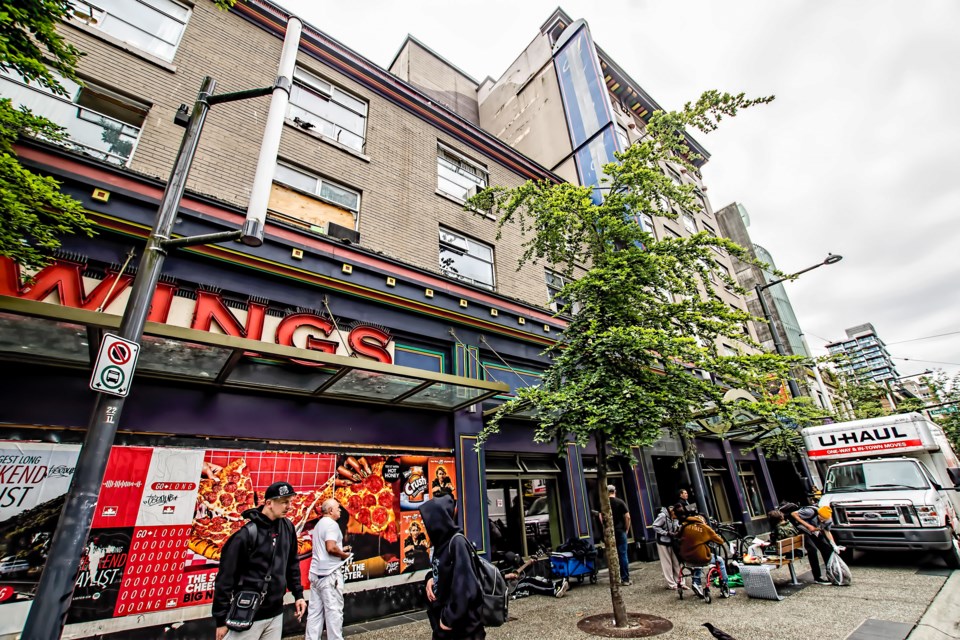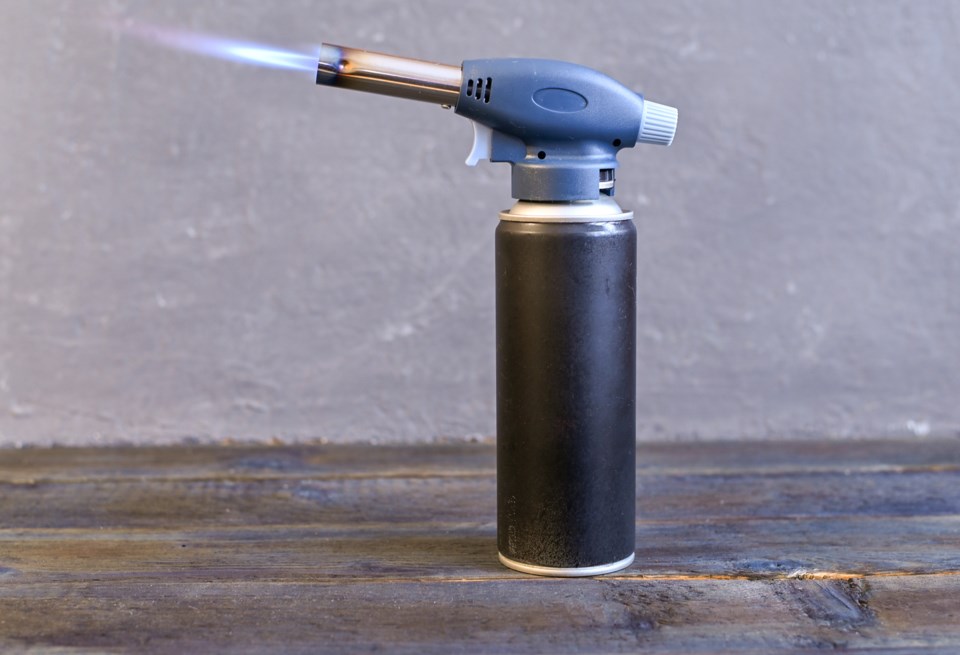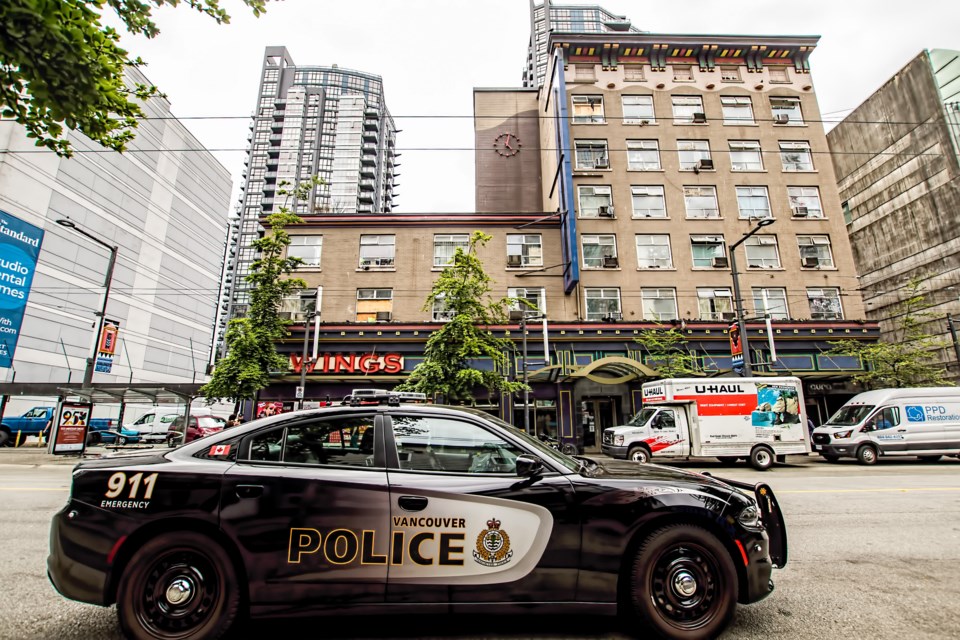The City of Â鶹´«Ã½Ó³»has identified five of its own sites that would be suitable for supportive housing and allow tenants currently living in problem buildings on the downtown Granville Street strip to be relocated.
Mayor Ken Sim announced the sites in a news release Thursday but did not provide locations or disclose whether the properties had existing buildings on them. Potential move-in dates — or when development or renovations would begin — were also not released.
“The exact locations of the five initially proposed sites are confidential as internal memos or ministerial letters related to potential City of Â鶹´«Ã½Ó³»real estate transactions cannot be released without a vote of council,” said Taylor Verrall, the mayor’s press secretary, in an email.
“This is longstanding City policy as publicly releasing the locations could have a significant commercial impact on the properties in question.”
The mayor issued the release because he felt that it was in the public interest to provide an update to residents and businesses on the progress being made, said Verrall, noting “we are hopeful that the Province is ready to work quickly and collaboratively on this file.”
Sim’s interest in this file stems from council’s recent decision to approve for the Granville strip, which calls for no new social or supportive housing in what has been Vancouver’s entertainment district for decades.
Two recent fires at the 110-room Luugat supportive housing at 1176 Granville St., along with continued calls for police and firefighters to attend the building as well as two others on the strip owned by the provincial government, escalated the mayor’s push for tenant relocation.
“We want on-site security, and we want there to be an ability for the residents to participate in the road to recovery program,” Sim told BIV in an interview in June. “So we're not asking for anything that's way out there.”
The mayor has said any replacement buildings should only allow up to 50 tenants. The total number of tenants living in the Luugat and the provincial government-owned St. Helen’s Hotel (1161 Granville St.) and Granville Villa (1025 Granville St.) is estimated at 270.

Ministry of Housing
The Ministry of Housing and Municipal Affairs said in an emailed statement Friday that the ministry supports the Granville revitalization plan and is “ready to work with the City to find a better place to offer supportive housing that works for people experiencing and at risk of homelessness, and for businesses and tourism.”
The ministry added: “To advance this direction quickly, the City needs to identify and pre-zone potential sites that support densities sufficient to replace and expand the supportive housing units that will be replaced. We are reviewing the initial list of sites put forward by the City of Â鶹´«Ã½Ó³»and are eager to move forward in partnership.”
Sim is on record of not wanting to allow any “net new” supportive housing in Vancouver, but has not pushed back on renovations or replacements of existing housing, which is normally in the form of old single-room-occupancy buildings.
June 20, the Luugat, St. Helen’s and Granville Villa have generated thousands of police and fire calls in the past five years.
The B.C. government purchased the Luugat — then a Howard Johnson — in 2020. The purchase price, which included an adjacent parking lot, was $55 million. It was first tenanted by people living in the Oppenheimer Park encampment.
At the Luugat-Howard Johnson alone, firefighters responded 906 times to the building between Jan. 1, 2020 and May 29, 2025. The calls included 43 fires, 375 medical incidents, 334 alarms and 87 for public service.
Â鶹´«Ã½Ó³»police responded to 649 calls at the Luugat in 2024, with the top five calls being for unwanted persons (107), disturbance (61), other Criminal Code (56), check well-being (42) and missing persons (41).

Locking butane torches
Two recent fires at the Luugat were caused by locking butane torches, which are not allowed to be sold in Vancouver. That bylaw stems from a council decision in April 2024, yet the fire department said this week that sales remain active.
On June 26, members from Â鶹´«Ã½Ó³»Fire Rescue Services community safety division, made up of public educators and fire prevention inspectors, inspected 168 licensed retail vendors around the city.
Of the 168 vendors visited, 83 were found to be selling the torches.
“The use of continuous locking torches remains a high-risk activity for all people using the device because of the ability to focus, and lock, a pressurized high temperature continuous flame onto combustibles,” the department said in a news release.
Fire Chief Karen Fry said more help is needed from the provincial and federal governments regarding the importing, distribution and sale of the devices.
“People are being injured, housing is being compromised, and businesses are feeling the effects of fires and sprinkler activations,” Fry said.
Meanwhile, the provincial government announced June 30 that a new, “time-limited working group” will act on requests from housing providers for more authority to respond to urgent safety issues and to explore the potential to remove supportive housing from the Residential Tenancy Act.
This will help to better address problematic and dangerous individuals taking advantage of vulnerable people, and better respond to weapons and criminal activity within supportive housing, the government said.
Fentanyl smoke
In addition, the provincial government, including the BC Centre for Disease Control and in partnership with WorkSafeBC, is working to respond to significant changes to the ongoing toxic-drug crisis and its potential effect in supportive housing.
Early indications from a series of tests at 14 buildings in Victoria and Â鶹´«Ã½Ó³»show some areas of supportive housing are more likely to have elevated levels of above the limit WorkSafeBC has established.
BC Housing is analyzing the reports from the tests and is working with WorkSafeBC and BC Centre for Disease Control to better understand the results, the government said.
“The results in the reports will contribute to the development of provincial exposure-reduction guidance being established by WorkSafeBC and BC Centre for Disease Control, with support from BC Housing and other health partners, to mitigate second-hand exposure to fentanyl in supportive housing and shelters,” the government said.
“The new working group will also discuss second-hand fentanyl smoke.”
X/@Howellings



